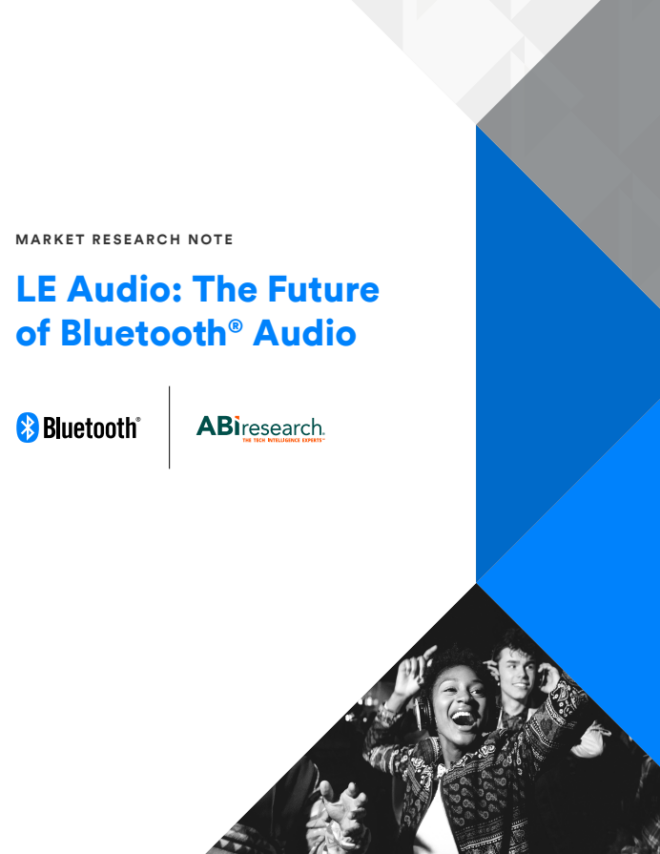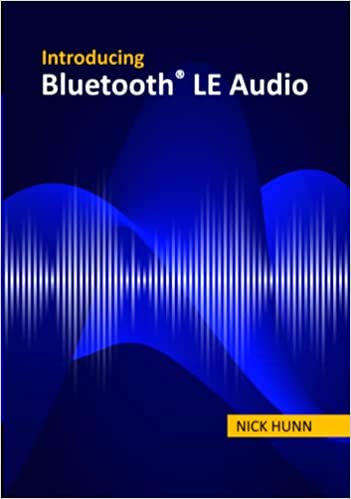With 1.5 billion people living with hearing loss, Bluetooth® technology has the potential to transform the hearing aid market, which is where Bluetooth LE Audio was first conceived. Firstly, the LC3 codec can help enable hearing aid developers to offer improved battery life (up to 50 percent), reduce the size, or create new form factors that may have been limited by battery constraints while maintaining or improving the audio quality. Secondly, Bluetooth LE Audio provides the ability for hearing aids to directly connect with smartphones, TVs, and other source devices for calls, audio, and video content without the need for additional intermediary devices.
Bluetooth hearing aids already exist on the market today via Apple’s MFI hearing aid technology and Google’s ASHA implementations. ABI Research expects increased penetration of Bluetooth technology in these devices over the coming years, thanks to Bluetooth LE Audio’s ability to standardize the user experience, open up the market beyond closed vendor ecosystems, and enable innovative interoperable Auracast™ broadcast audio use cases.
While the conventional hearing aid market has grown in recent years, reaching 19 million units globally in 2021, growth in the hearing aid market is expected to accelerate further over the next few years, particularly in the U.S. In August 2022, U.S. Food and Drug Administration (FDA) finalized its rule to establish a category of over-the-counter (OTC) hearing aids that consumers with mild to moderate hearing loss can purchase directly from stores or online retailers without a medical exam, audiologist visit, or prescription. The aim is to help expand adoption via greater competition, lower costs, and greater access. By the end of the decade, ABI Research expects this OTC market segment will have overtaken the existing hearing aid market size by a significant amount and that these devices will benefit from rapidly embracing Bluetooth LE Audio.
![]()
MARKET RESEARCH
LE Audio: The Future of Bluetooth® Audio
Get new forecasts about when and which audio devices will adopt Auracast™ broadcast audio, along with predictions for when public locations will deploy this new Bluetooth capability to enable new audio use cases in their venues.
Enabling a Global Assistive Listening Ecosystem
Auracast™ broadcast audio has significant potential to become the next-generation assistive listening technology. However, it will need to overcome a number of hurdles if it is to build success.
Auracast™ broadcast audio has significant potential to become the next-generation assistive listening technology.
Firstly, hearing aid uptake today is itself still limited; reasons include high costs, stigma around hearing aid use, lack of perceived need, and educational barriers. Therefore, another driver of longer-term Auracast™ adoption will be to increase the usage and adoption of assistive listening devices more broadly. This will require greater choice and flexibility in assistive listening solutions, smoother purchase cycles, higher-quality devices, more affordable products, the removal of stigma, greater awareness of hearing loss, and education on adoption benefits. Greater availability of OTC solutions across different regions will also accelerate adoption, but this will likely depend on regional restrictions and availability.
From a regulatory perspective, much work also needs to be done to incentivize Auracast™ broadcast audio as a primary assistive listening technology in various public venues or within new buildings as standard. Despite being around for several decades, the assistive listening market in public spaces itself — whether that be hearing loops, FM systems, IR, radio-based solutions, or other technologies — remains relatively limited in terms of their installed base.
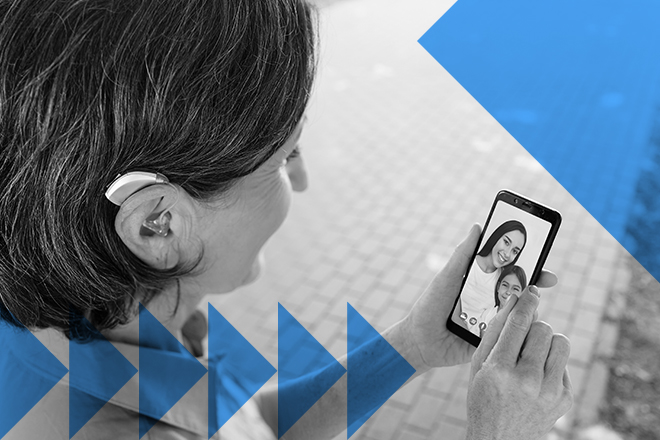
Related to this will be the need to educate all aspects of the industry on what Auracast™ broadcast audio can do, where it is deployed, and how it can be used. One of the biggest problems with assistive listening solutions today has been lack of awareness of whether a solution is available and how it can be leveraged, among both staff and hearing aid users alike.
An ecosystem of system integrators and installers will also need to be formed to help rollout Auracast™ broadcast audio solutions across a larger number of public venues. The technology must meet specific standards that go beyond what is available today and ensure that all user experiences are high quality, intuitive, and standardized, regardless of where it is implemented. Here, the Bluetooth Special Interest Group (SIG) will play an important role via its deployment guidelines, branding, and licensing requirements in order to ensure a consistent Auracast™ broadcast audio experience across all venues.
It will also be critical to ensure that Auracast™ adoption does not detrimentally impact current users of assistive listening devices, and there may need to be a lengthy managed transition. There is likely to be a significant period when existing hearing loop technology will co-exist with growing numbers of Auracast™ solutions.
![]()
ON-DEMAND WEBINAR
What Product Developers & Public Locations Need to Know About Auracast™ Broadcast Audio
Watch this discussion on how Auracast™ broadcast audio will introduce new opportunities for wireless audio developers and allow public locations to enhance their visitor satisfaction while increasing audio accessibility for all.
While both technologies are likely to coexist for the next couple of decades, the ability for Bluetooth LE Audio to broadcast one or several audio streams to an unlimited number of Auracast™ receiver devices will help create a more scalable assistive listening solution that could eventually supersede existing hearing loop deployments and open up additional accessibility options for those with hearing loss. Despite the aforementioned challenges, Auracast™ transmitters have the potential to be more cost effective, provide a more consistent and higher-quality experience, and be easier to deploy. This will allow for a much greater expansion of assistive listening solutions than other technologies can achieve.
Auracast™ transmitters have the potential to be more cost effective, provide a more consistent and higher-quality experience, and be easier to deploy.
Furthermore, as more and more OTC hearing aids, conventional headsets, and true-wireless earbuds support Bluetooth LE Audio and Auracast™ broadcast audio, the lines between consumer devices and assistive listening devices will increasingly blur. Many more people with mild to moderate hearing loss will be able to take advantage of lower-cost, interoperable solutions that can engage with future Auracast™ deployments and benefit from improved assistive listening experiences. This greater variety of devices should hopefully lead to the removal of any remaining stigma around those with hearing loss and instead spur on a wave of innovation and greater accessibility for millions of people around the world.

FEATURED INNOVATION
Auracast™ Broadcast Audio
Auracast™ broadcast audio will deliver life-changing audio experiences that will enhance the way you engage with others and the world around you.

難聴者の人口が世界で15億人に上る中、Bluetooth®技術には、LE Audio誕生のきっかけとなった補聴器市場を一変させる大きな可能性があります。第一にLC3コーデックにより、補聴器メーカーは音質を維持または向上させながら、バッテリーの長寿命化(最大50%増)と同時に小型化を実現、もしくはこれまでバッテリーの制約のため実現できなかった新しい仕様や規格を生み出せるようになります。第二に、LE Audioが提供する機能により、補聴器は他の機器を介さず直接スマートフォン、テレビ、その他の音源に接続して、通話やオーディオ・動画コンテンツ視聴が可能となります。
Bluetooth補聴器は既に市場に登場しており、Apple MFIの補聴器対応技術やGoogleのASHAを実装した製品が販売されています。さらに将来的には、補聴器におけるBluetooth技術の普及はますます進むとABI Researchは予測しています。LE Audioによってユーザー体験の標準化が進み、補聴器メーカーの閉じたエコシステムを超えて開かれた市場が形成され、革新的な相互運用性のあるAuracast™ ブロードキャスト オーディオのユースケースが実現可能となるためです。
近年では従来型補聴器の市場も拡大しており、2021年には世界市場が1900万台に達し、特に米国では今後数年の間に補聴器市場の拡大はいっそう加速すると予想されています。2022年8月、米食品医薬品局(FDA)はOTC補聴器のカテゴリー設定のための最終規則を発表し、軽度から中等度の難聴者は、医師や聴覚士の診察・処方箋なしに、補聴器を店頭またはオンラインで直接購入できるようになりました。この目的は、競争を促進し、価格を下げ、手に取りやすくすることにより、補聴器の利用を拡大することにあります。ABI Researchの予測では、OTCの市場セグメントは2020年代末までに従来型補聴器の市場規模を大きく上回ると見込まれ、LE Audioへの迅速な対応がOTC補聴器に利点をもたらすとの見通しです。
グローバルな聴覚補助エコシステムの実現
Auracast™ ブロードキャスト オーディオは次世代聴覚補助技術へと成長する非常に大きな可能性を持っていますが、成功を収めるためには越えるべきいくつかのハードルがあります。
第一に、現在ではまだ補聴器の利用そのものが限定的です。その理由として、購入費用の高さ、補聴器の使用をめぐる心理的抵抗感、必要性に対する認識不足、啓発における障壁などがあります。このため、聴覚補助機器のより広範な利用と普及の拡大が、Auracast™の長期的な導入促進においても一つの鍵となります。これには、聴覚補助ソリューションに対する選択肢と柔軟性の拡大や、より円滑な購入サイクルと機器品質の向上、より購入しやすい価格帯の製品、装着に対する抵抗感の排除、難聴に対する認識の高まりと、聴覚補助の利点に関する啓発が必要です。OTC機器の入手が多くの地域で大幅に容易になることも普及加速につながる見通しですが、これは地域ごとの規制や製品の入手可能性にも左右されます。
規制という観点からは、各種施設でAuracast™ ブロードキャスト オーディオを主要な聴覚補助技術として導入してもらう、または新築の際の標準設備として設置されるには、その導入がもたらす利点を周知するためすべきことが多くあります。公共の場における聴覚補助システムの市場は数十年前から存在するにもかかわらず、ヒアリングループ、FM、赤外線、無線その他の技術のいずれにおいても、比較的限られた設置規模が続いています。
その意味では、業界のあらゆる方面に対し、Auracast™ ブロードキャスト オーディオによって可能になることや、展開できる場所、活用方法について、啓発していく必要があります。今日の聴覚補助技術が抱える最大の問題の一つは、技術が利用可能かどうか、またどのように活用できるのかに関して、補聴器業界および使用者の両方で認識が欠如していることにあります。

Auracast™ ブロードキャスト オーディオをより多くの施設に展開していくには、システムインテグレーターや設置事業者のエコシステムの形成も必要となります。そこで使用される技術は、今日の技術の先を行く特定の水準を満たし、設置場所にかかわらず、利用者全てに高品質で直感的かつ標準化された使い勝手を提供できることが求められます。Bluetooth SIGがここで果たす重要な役割は、導入ガイドライン、ブランディング、ライセンス要件を通じて、Auracast™ ブロードキャスト オーディオの利用体験があらゆる施設で可能となるよう実現していくことにあります。
従来の聴覚補助機器の使用者に対し、Auracast™の導入が悪影響を及ぼさないよう確実にしていくことも重要であり、長期間にわたる管理された移行が必要となる可能性もあります。従来のヒアリングループ技術が、普及していくAuracast™技術と並行して使用される期間が長く続く可能性は高いでしょう。
これらの技術が共に今後数十年にわたり併存する可能性は高いものの、複数のオーディオストリームを台数に制限なくAuracast™対応受信機に向け配信できるLE Audioの機能は、より拡張性の高い聴覚補助システムの構築を助け、既存のヒアリングループに次第に取って代わることで難聴者の選択の幅を広げることになります。先述の課題があるにもかかわらず、Auracast™送信機には高い費用対効果と、安定的でより高品質なサービスを提供し、より容易な導入を実現できる可能性があります。他の技術によって実現された以上の、はるかに広範な聴覚補助技術としての普及が期待できます。
その上、より多くのOTC補聴器、従来型ヘッドセット、TWSイヤホンなどLE AudioおよびAuracast™ ブロードキャスト オーディオ対応機器が普及するにつれ、一般的なオーディオ機器と聴覚補助機器との境界線も薄れます。軽度から中等度の難聴者のより多くが、将来的なAuracast™導入によってより安価で相互運用性の高い技術の恩恵を受け、より質の高い聴覚補助サービスを享受できるようになるでしょう。機器の多様性が大きく増すことにより、難聴者をめぐるあらゆる抵抗感や偏見が払拭され、それに代わるイノベーションとアクセシビリティの波が世界中の多くの人々に届くことでしょう。







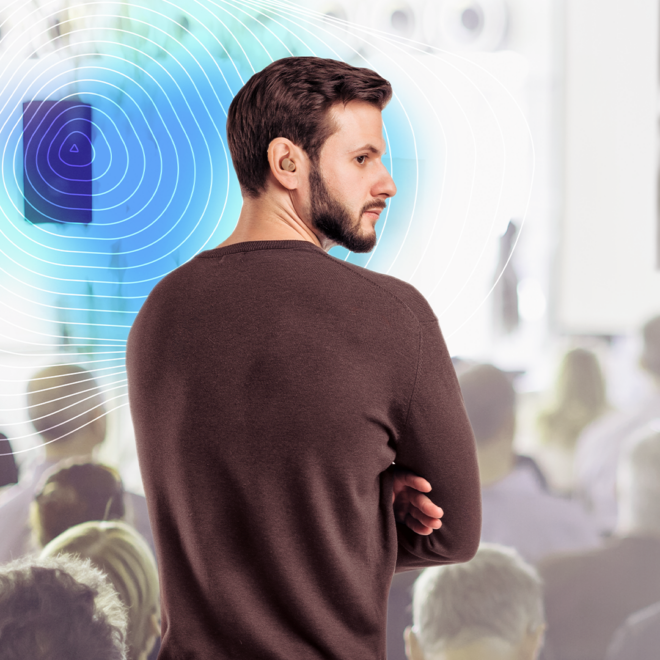


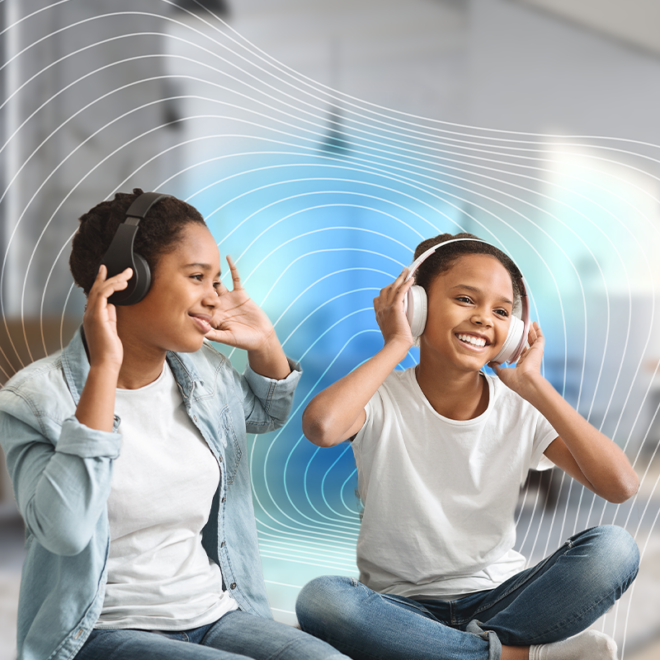

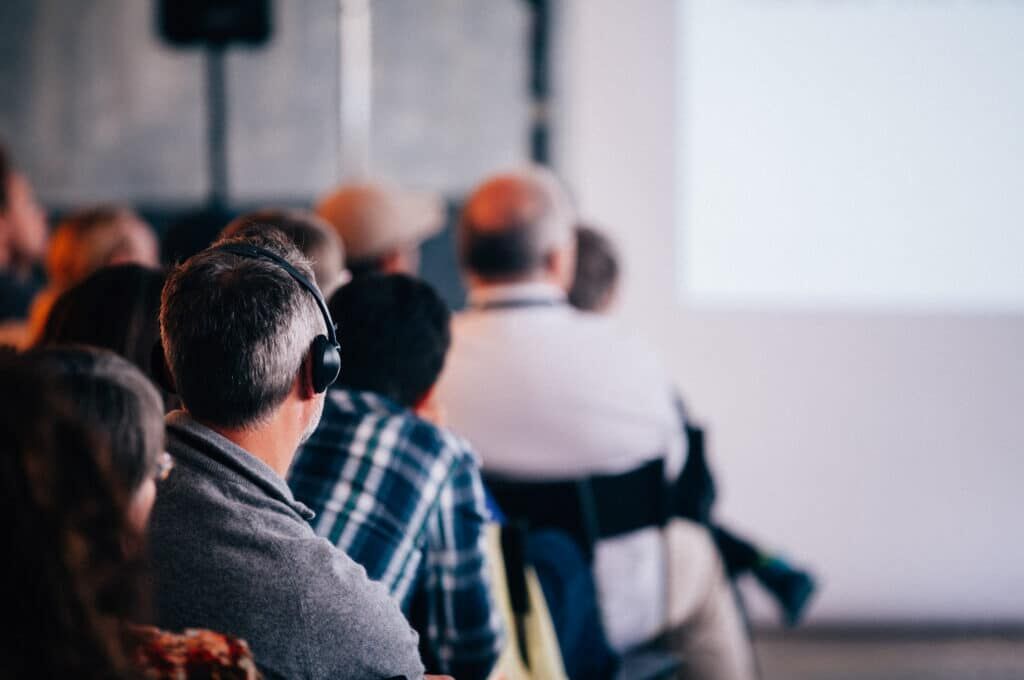
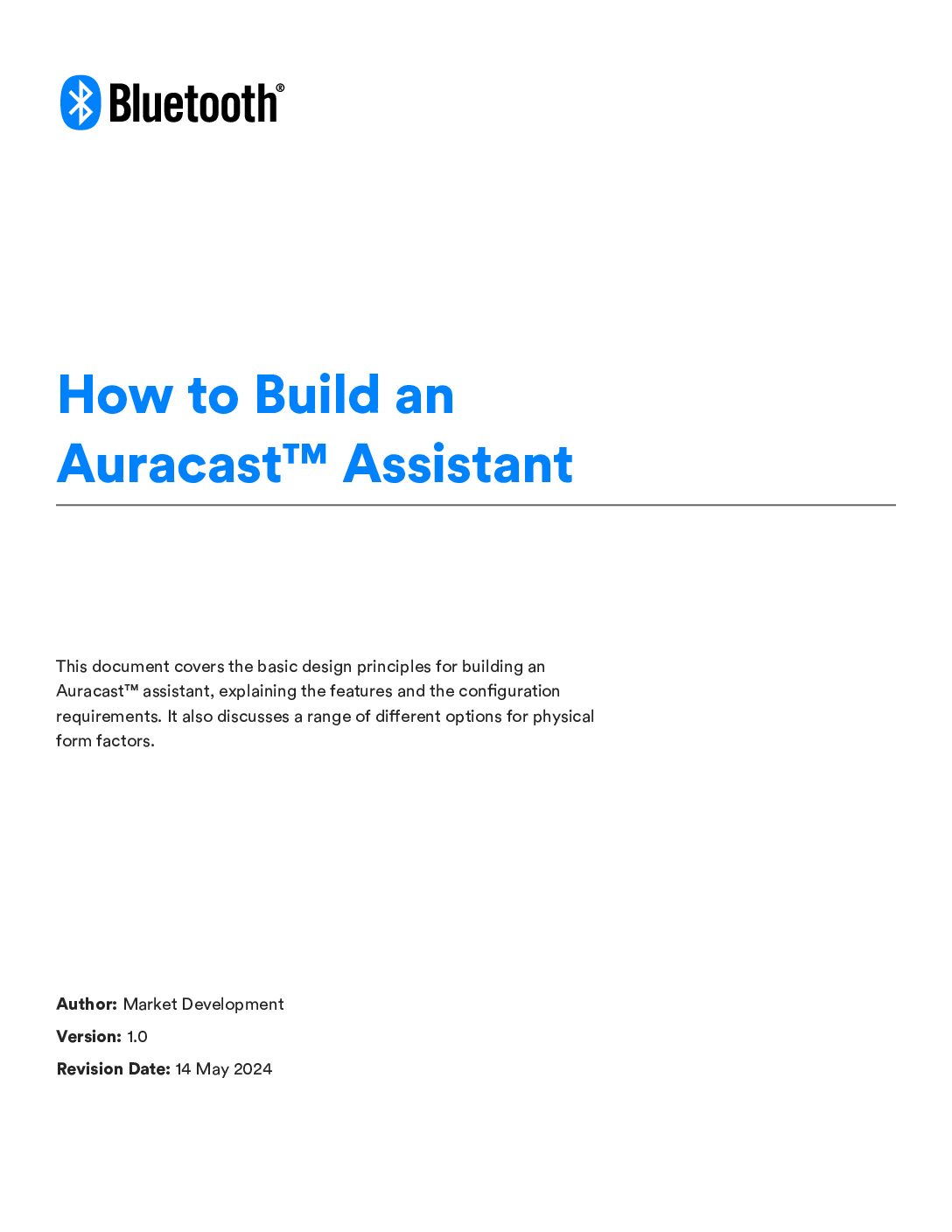
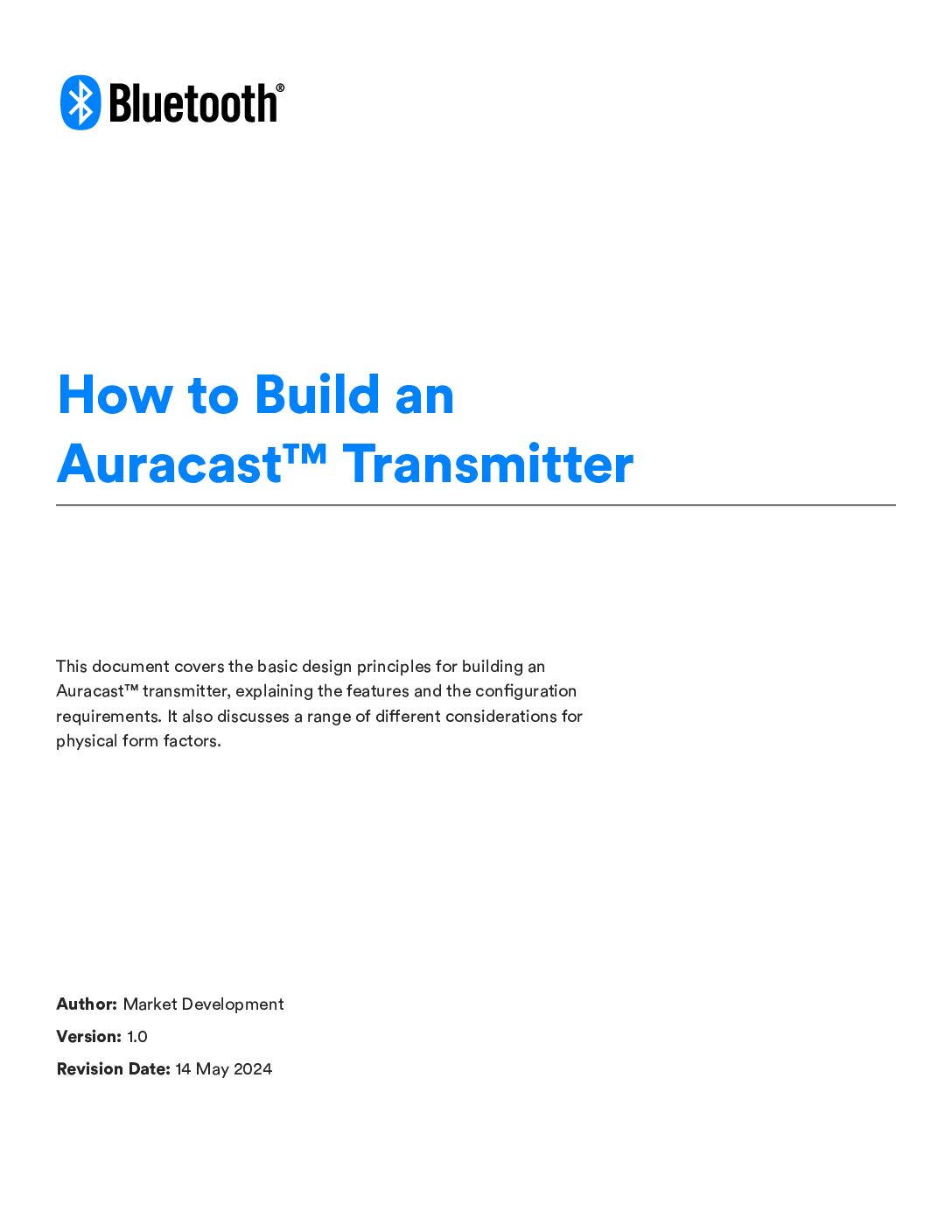
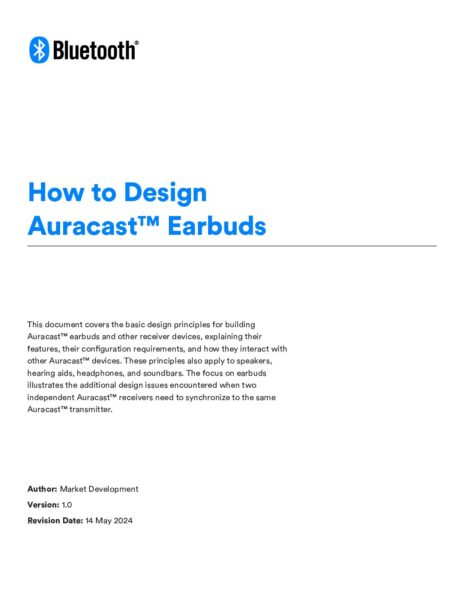

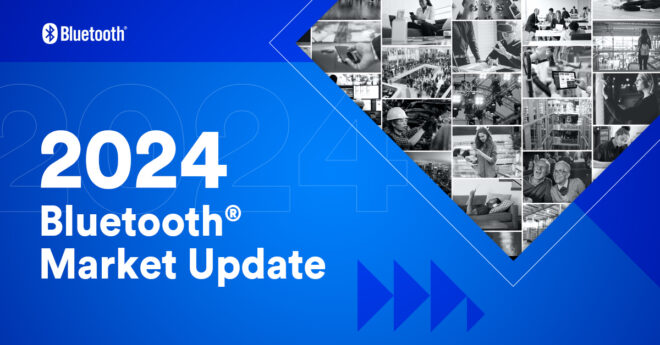
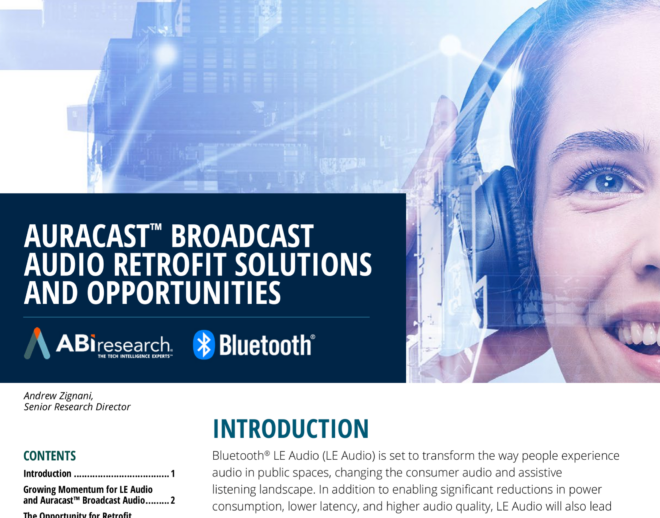
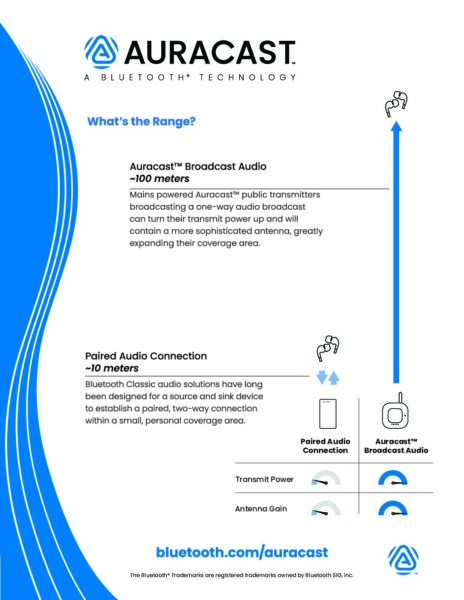
![2312 CES Handout Images FINAL existing pdf 464x600[1]](https://www.bluetooth.com/wp-content/uploads/2024/01/2312_CES_Handout-Images_FINAL-existing-pdf-464x6001-1.jpg)
